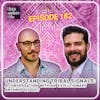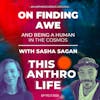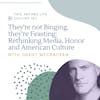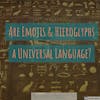Happiness and the Good Life According to the Aztecs w/ Dr. Ryan Collins
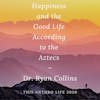
A happy New Years! Enjoy this mini-episode with Adam and Dr. Ryan Collins exploring happiness and the good life according the Aztecs. New Years is a great time to reflect on where we've been, where we're going, and what's it all for. We find some answers and surprising wisdom with the Aztecs.
Purcell - The Aztecs on Happiness
Carrasco - Daily Life of the Aztecs
--- Send in a voice message: https://anchor.fm/thisanthrolife/message Support this podcast: https://anchor.fm/thisanthrolife/support
Happiness and the Good Life According to the Aztecs
Adam Gamwell: [00:00:00] Hey guys, Adam, here from This Anthro Life, I want to let you know that today's episode is brought to us by Anchor. It is the easiest way to make a podcast. Let me explain it's free. And they offer creation tools that allow you to record and edit your podcast right from your phone or your computer. So you don't have to use a bunch of complicated editing software and plugins and such.
Anchors got it all built in, which is great. They can add music. You can add sound effects. You can add multiple voices. You can add different segments of episodes. It's really easy and fun to use. I've been using it for a while now. On top of that, Anchor will distribute your podcast for you so it can be heard on Spotify, Apple podcasts, and any of the other great platforms where people like to download and listen to voices.
What's super cool is that you can make money from your podcast with no required minimum listenership. Now think about that. That's a very important thing for democratizing podcasting and helping the little guy and little gal, make a little money on the side and find some extra support for their podcast.
So it's everything you need to make a podcast in one place. So download the free anchor app or go to anchor.fm to get started.
Hey folks this is Adam Gamwell here for This Anthro Life, bringing you a special mini episode for New Year's to carry us over the threshold. Now if you're like me, New Year's Eve is the time of reflection of thinking back on, where you've been in the past year, you know, the ups and downs, what'd you improve or perhaps what to do a little less of, and where you might like to go next year?
This is why we tend to see the gym membership, skyrocket or friends threatening or promising to call their parents more often in the coming year now, rather than talking about resolutions, though, I want to point out that our care about being better next year has a lot to do with what we think it means to be happy and what it means to be a good person.
However, is what it means to live a worthwhile life. A good life. Oftentimes when we think about how to understand happiness we think of psychology or maybe flow states or being with loved ones. But what most people don't know is that even though happiness is a universal human emotion, and most of us strive to live a good life, what it means to live that good life is culturally specific and it might surprise you so is what it means to be happy.
So for this mini episode, I'm joined by my friend and colleague, Dr. Ryan Collins, archeologists and burgeoning mixologist, which is a fancy talk for a guy that knows how to make good cocktails to unpack what happiness and the good life meant for a group of people we don't often associate with these ideas, the Aztecs.
Despite what you may or may not have been taught in schools the Aztecs were not only focused on human sacrifice. They had developed a rich, philosophical tradition that guided their ways of life. And in that wisdom, we can find both similarities to what many of us grew up with and important differences that can enrich and widened our understanding of happiness and what it means to live that good life.
Cause of course, as you remember, one of the superpowers of anthropology is looking at cultures different from our own on their own terms so that we can understand better where people are coming from and understand ourselves a little better too.
Hey Ryan, how you doing?
Ryan Collins: [00:03:05] Hey, what's going on?
Adam Gamwell: [00:03:05] Good to see you.
Ryan Collins: [00:03:06] Good to see you too.
Adam Gamwell: [00:03:06] Cool. It's funny because speaking of sacrifice. Um, you just lost your drink.
Ryan Collins: [00:03:12] Right. So it was kind of a little sacrifice. But sometimes sacrifice can relate back to that idea of happiness they were talking about before, especially if we're going to bring the Aztec into perspective.
No, as we were both saying, you tend to think about the Aztec and sacrifice. Not so much the Aztec and happiness. Right. So maybe we can play with the idea of happiness. What comes to your mind? Uh, when somebody tells you, ask you what happiness is.
Adam Gamwell: [00:03:41] Yeah. It's a good question. For me, it's I guess, things or actions like being with family, about, kind of being part of a community, being a valued member or a member that adds value too, not just like people love me, but thought that I do something for the community, you know? Kind of, I guess it's like being part of a team, you know?
Ryan Collins: [00:04:06] Yeah. And I think for the Aztec, there's a lot of aspects of that that would have rung true as well. The idea of living within a community and also for that community. So let's maybe talk about that whole sacrificing so we can get that out of the way.
Adam Gamwell: [00:04:20] The elephant, the sacrificial elephant in the room.
Ryan Collins: [00:04:22] If there was a sacrificial elephant, we would all be in for an interesting New Years, that's for sure. Yeah. But, the first thing we have to remember about sacrifice is it gets back to the origin story for the Aztec and really for all of Mesoamerican cultures. And that's the idea that the deities, the different Pantheon of deities, had sacrificed their presence, their ability to either be on the earth or sacrifice himself in some way to allow for the creation of humans.
So there is this idea that you had to die in order for your creation to persist in that community to come forth and prosper. When you think about this idea of reciprocity, that's ingrained within the culture, sacrifice was then expected of every human to then allow for the gods to survive.
Adam Gamwell: [00:05:11] Wow. It's interesting because that's not. It's not super different from how we might think about sacrificing your own time for work in order to provide for your family. I mean, we may not think about work today as God. Right. But you know, some capitalists might say you should think about it that way, but.
Ryan Collins: [00:05:29] Exactly that idea that you're giving something, not just of yourself, but for some reason. And that would have been the central sort of focus for the Aztec or this idea of rebirth renewal and sustenance tied into that whole sacrifice, however it was going to happen. Sometimes sacrifice could have been on a small scale, just bloodletting, men and women would both do this through different means and we're not going to get into that today, but it would be simply allowing your blood to be offered up sometimes with incense to venerate the ancestors, to venerate the deities. But then there was also a human sacrifice and that's what we tend to think about more. Yeah. And you know, if you're sacrificing a human, you could say, well, that's, that's scary. It's horrific.
Adam Gamwell: [00:06:14] It sounds, it sounds scary. Yeah.
Ryan Collins: [00:06:16] Great. I don't want to be that. I don't think you want to be that.
Adam Gamwell: [00:06:17] No, no, no.
Ryan Collins: [00:06:20] But if you think about it as being one of the most precious things, that human life is the most precious thing that was given to you by the gods sacrifice of themselves, it's also the most precious thing that you can give to them for their sustenance.
Adam Gamwell: [00:06:32] Wow. Interesting. And so, when you, when you take it and think about it on its own cosmology like that, then it does make sense.
Ryan Collins: [00:06:39] Exactly. And if we think about that in play with the ideas that grounded Aztec religion, you can think about it as a pivotal dance between order and chaos, a sort of balancing act, not so much good and evil, but order and chaos. If we think about those two principles is why you might sacrifice it to maintain order.
Adam Gamwell: [00:06:59] Hmm. No, that's actually super cool to think with. You remind me again, we've looked at a bunch of different things from a couple of professors, Sebastian Purcell, David Carrasco, who's at Harvard.
And what's interesting is they've looked at a bunch of different texts from the Aztec that were collected, chronicled when different missionaries were there in different documents that connected or collected oral histories and such. And it's interesting because even on the cosmic scale, we're talking about, there is this kind of chaos order, which is a really interesting, compelling kind of back and forth.
But then we also see this in dialogues between a mother and a daughter. There's one recording that Purcell talks about that basically this mother is talking to her daughter and says that the earth is not a good place. It's not a place of joy or a place of contentment. But it's actually said to be a place of joy fatigue, or joy pain.
And even these words, the way that they're kind of articulated together speaks to this tension between chaos and order almost. Right?
Ryan Collins: [00:07:54] Right. Because it's expected that there's going to be some sort of good, there's going to be some sort of bad, then that's reflected down onto the individual level.But on the individual level, it's not really as important as these wider ideas. How about community? What about your kin group or what about the state of the, well, the state, the Aztec state, the Mexica, or their empire? The triple alliance. Yeah.
Adam Gamwell: [00:08:19] Yeah. I mean, that's the thing again, it's always between all these levels. Right? And it's interesting cause it's not different from how we live our lives today. Right? You have your individual self, you have your family, your friends, your community, your workplace, your government. And so you have to kind of account for all of these, what does it mean to like work at all these different levels?
It's funny. Cause it's not hard for us to do that. Right. We do it normally but it's really kind of interesting to think that we don't always pause to say actually, how would another group do this? And the Aztec had an entire philosophy around this whole system too, right?
Ryan Collins: [00:08:49] Oh, entirely. Yeah. Yeah. And so for them, well, I mean, we can think about happiness as being, how do you create order? Sometimes in that world, you can do this on an individual level. You can do it on a heightened community level and you can do it even broader than that.
Adam Gamwell: [00:09:03] Yeah. Totally. Yeah. There’s this concept. I'm going to pronounce this as best as I can but its. Nenemiztil And that literally means rootedness in this case, or it also means truth or goodness, more broadly in what this concept does. Nenemiztil it's the idea of what does it mean? This is how to live a good life, a rooted life, a life that is worthwhile.
Meaning that you're rooted in these certain kinds of ways of being right. And that kind of, as you're saying to one is being rooted in one's character. In this case, being rooted in one's body. I love the idea that your character of yourself is rooted in your body. So this we'd see the Aztecs doing specific things like daily exercise regimes, we care about looking good or being fit. And that's why at the New Year we tend to see people getting their gym memberships, right. Because they're like, Oh, well, it's time to pause and think about this, this rebirth, this cycle happening again. So therefore this time I'm going to get it right. You know, interesting that the Aztecs had the same idea of being rooted in, in your character, of yourself, of your body which is quite cool. And then with that too, the second level would be the psyche. And this to me talks to this Descartes. We might think about this, the mind-body split we tend to think about in the normal quote “Western Canon” right of how we think about am I my mind? Am I my body?
You know, nowadays we see them much more intertwined, I think. But then the Aztecs thought about the same way, right? It was kind of rooted in your body and rooted in your psyche. What's cool is the way they talked about it a little bit differently. Was this you want to have a balanced same idea with the chaos and the order of like being bounced between your heart, which is your desire, your seed of desire or your face, your judgment, which is really interesting to think about that,
Ryan Collins: [00:10:36] Yeah. We can even think about Mesoamerican principles more broadly, not necessarily just Aztec but across the board with the Maya, the Olmec, Zapotec, Mixtec and we could go on for, we're going to stop it there. But the point is you have this idea sometimes of your soul as being something that's almost outside of your body.
It's locked within your body, but it's not always you. So it's kind of coming and bringing the two separate sides of yourself. Sometimes one is more humanistic, the other more animalistic and one's going to be more orderly. The other is going to be more based in some sort of chaos, more things that we might call nature and balancing those two things is part of what that psyche I think entails.
Adam Gamwell: [00:11:15] That's super cool. Yeah. And it makes sense to the idea of order chaos. And we tend to also then split the animality and the human as two different sides of that. And that actually leads again in the Aztec a little ladder here, we're going from like kind of character of body into, into mind psyche then it's community. Right. We were talking about it a little bit before too. And like that's interesting. Cause the social role is a huge part of. How do we know who we are?
Ryan Collins: [00:11:36] Right. I think if we’re reflecting on our state in the United States as a community today is where we all find ourselves who we're in a class system where sometimes we don't like to reflect on our class systems, but we now understand that they exist.
It would have been very similar. There are rigid class systems. You wouldn't have had much away from mobility, but it doesn't mean you don't find ways to have power or say within your community to be a good community member, to understand who your group is. They definitely knew who their communities were, right?
Adam Gamwell: [00:12:08] Hmm. That's super interesting. And even with that too, it's that the U.S. is in the Western culture as a whole is a little bit less about this, but it was interesting too, in related to that is that so much of these roles were kind of both learned and articulated in a calendar festival
Throughout the year there's different, special, sacred days. Right. You know, and that could be divine days of rituals and mournings, or it could be ceremonies of having a child or birthdays. Right. And it was interesting that there's these shadings they'd see also of both denial and excess, the same way that when the Christian calendar was in lent that you give something up to sort of show your devotion to the Christian God or Jesus Christ, or they also had festivals of excess, like we have Mardi Gras, right. Which sort of gets rid of all your bad stuff before Lent happens anyway. Interesting to see that in these roles are kind of where people would explore and play with those social roles.
What level of class am I in this? That's why Mardi Gras is one of the interesting festivals that we may know more about because it is kind of a time of excess in which you sort of let go of social conventions, test the limits and it's okay to test them.
Ryan Collins: [00:13:19] Right. Yeah. And for the Aztec too. Knowing when you can test those limits was so rooted in concepts of time concepts of a calendar system. Sometimes it'd be rooted on these festival days, sometimes it was rooted in the sense of what it meant to live a life. So for the Aztec there was a short cycle of 52 years. And after you had to achieve your 52 years, you were seen as having carried your burden of life. So after that point in time, you would be allowed to defy certain social conventions. You could be publicly drunk and that wouldn't get you throw into some sort of form of a prison or something, maybe potentially worse.
Adam Gamwell: [00:13:59] That’s a plus.
Ryan Collins: [00:14:00] Definitely a plus. There are some benefits that come with this. There's also a recognition that you had paid your dues, your time had been paid.
Adam Gamwell: [00:14:08] That's cool. And that's it's. I love the idea of it respecting your elders too, so kind of, as we find ourselves cycling into another year, again, we each get a year older. Maybe we make it to 52 and beyond. That's an interesting idea, but it's nice to know that there's affordances. Given to those that kind of again, pay their burden. This is, I think the idea of, of living a good life too, is that, do you pay your roles? Do you play your role and pay your role to society? Right.
Ryan Collins: [00:14:32] Exactly. And you would pay that role and once you had paid it would be respected and seen because you had done this for a community, you did it for something beyond yourself, even though we might say it's simply living your life.
Adam Gamwell: [00:14:43] Yeah. That's interesting. Yeah, and then do you think about this? I'm curious about this too, cause there's like the thing in the fourth layer in this sort of rootedness that we see in the Aztec world, again, we have character, which is your body and then we have psyche your mind, judging heart and judgment. Then we have this idea of community in these calendars. And then the third one is this or fourth one, sorry is called teotl in Nahuatl it's sort of the divine and single being of existence. It's interesting because this is not a monotheistic God, but it might be thought more akin to nature.
Ryan Collins: [00:15:12] Right? Yeah. I always like to come back to the moment where Cortez and Montezuma come to meet each other in this miscommunication that happens when Cortez and his garrison bow down and their not bowing down bowing down. That's a misconception they're actually paying homage to the earth. They're looking at their most sacred being and offering as a gesture of kindness.
Adam Gamwell: [00:15:34] Wow.
Ryan Collins: [00:15:34] Of reverence
Adam Gamwell: [00:15:36] That definitely says a plus one for anthropology, getting to know people's cultural mores and why they're choosing to do what they do. When you think it's bowing down to you, they're actually paying respect to the earth. Very different.
Ryan Collins: [00:15:46] And again is when you're meeting newcomers. That you're paying respect to the thing that may have brought it there together. So you meet somebody and you kiss the earth.
Adam Gamwell: [00:15:56] Wow. That sounds pretty nice too. It's even kind of like when you shake somebody's hand now, I think originally that was to show you didn't have a gun, right? You're not armed on some level, or the Romans grabbing the forearms.
Ryan Collins: [00:16:08] Exactly.
Adam Gamwell: [00:16:09] You know? Um, but it's an interesting idea too. It's just kind of understanding. Yes. Like what does the gesture mean? Or it's just kind of like when is a wink, a wink anthropologist Clifford Geerts might say right? So that's really cool. So again we put these pieces together, we have this, I'm not sure if it's a ladder or hierarchy, but this idea of rootedness that I think is just as compelling, in a very different way.
Again, we began talking about sacrifice and we can kind of come back around to it again, if we're paying reverence to nature, which is kind of the ultimate source of both joy and chaos or order and chaos, right?
Ryan Collins: [00:16:40] Yes. And again, thinking about the sacrifice we could think about it as a physical act, right? It's something that you're directly doing. So there's also those passive acts, simply living. Each day your body is growing older. Right? So you're carrying in the Aztec worldview, your carrying time. So every year you move forward is actually another ounce of weight being added to your back. Wow. So you're feeling that physical burden, because you are sacrificing the younger form of your body each year.
Adam Gamwell: [00:17:09] Interesting. And for the community. Right?
Ryan Collins: [00:17:11] Exactly.
Adam Gamwell: [00:17:12] That's super cool. Well, Ryan, this has been fun. We gotta get back out to the New Year's Eve festival now ourselves, but I want to wish everybody listening a very happy New Years. A grounded and fortuitous New Years.
Ryan Collins: [00:17:26] Exactly. And I hope that you don't feel the physical weight of the years that have passed by.
Adam Gamwell: [00:17:30] Yeah. And we'll be back again with more interesting ways of living well. Who knows we'll visit the Maya a little bit more next time maybe. We'll travel around the world, but anyway, it's been fun and we'll catch you all next time.
Thanks so much as always for listening and giving us a stellar 2019 for This Anthro Life. I cannot wait to share a 2020 with all of you. As always if you love the show or have a question or comment, please reach out. You can get me@thisanthrolife@gmail.com. My inbox is always open as well as you move into the new year if you're feeling generous. You can help support the show either on anchor.fm or on Patreon, either one of those accounts is linked in our show notes below. You can give as little as a dollar a month, five bucks a month, ten dollars, whatever works for you. It all helps me make the show, find new great guests, keep doing research and all the other stuff.
And most importantly, bringing you great content. You’ll definitely want to stick around in 2020. I'll be talking with great guests, such as Dr. Lily white, about forensic anthropology and working as a consultant for the police to identify bodies, Byron Reese, the CEO of Gigaom talk about AI robots and how to future proof your job and with Brooke Bierhaus about her documentary, The Connected Cup about coffee and culture, as well as her new work on women in documentary film, it's going to be an exciting and amazing 2020. And I can't wait to see you there talk soon. This is Adam Gamwell for This Anthro Life.
Ready to Explore Humanity’s Creative Potential?
Check out some of our most popular episodes that are great to start with.























